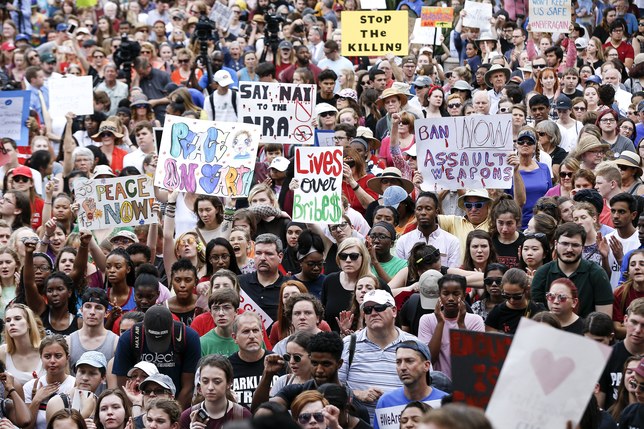Response to “Walk Up, NOT Out”
Walk up to somebody at school who appears to be alone and say something nice or offer a kind gesture. By doing so, we can eliminate the chances of another school shooting happening. That is the message that the movement “Walk up, NOT out” demonstrates. While this message is filled with good intentions and is an attempt to solve the ongoing gun violence issue that our nation is facing, it’s a toxic message to spread.
Walk up, not out is a response to the national school walkout that took place on March 18. The response encouraged students, faculty, and parents to walk out of school for 17 minutes to honor the 17 students and faculty members that were shot by Nicolas Cruz at Marjory Stoneman Douglas High School in Parkland, Florida on February 14.
Another national school walkout for high school students has been scheduled for April 20, 2018, on the day of the 19th anniversary of the Columbine shooting. This past Saturday, March 24, the “March For Our Lives,” was organized by the students of Parkland and a few national organizations in Washington, D.C. The march was organized to demand gun control and school safety, as well as to spread awareness about the gun-related issues that our legislators should work harder to eliminate. It was estimated that there were around 200,000 people who attended the march in D.C., and 800 sibling events throughout the United States.
Spreading a message of love and kindness is great, and I’m all for it. In fact, I think we need it now more than ever. However, using this message to oppose the walkout movement that victims of gun violence have organized as a form of demonstration against guns is a form of victim blaming.
Walk up, not out implies that because students didn’t go out of their way to say “hi,” or include their potential killer in their friend group, they are the ones responsible for the massacre. It also deflects the responsibilities from those who have control over this, like legislators and the NRA. It isn’t the responsibility of children to protect themselves. Being nice and not bullying others should always be something we teach children, but never teach this message to imply that being nice to an abuser will eliminate the impending consequences for not being nice enough. That’s like telling a victim of domestic violence to be nicer to their abuser if they don’t want to get beaten again. It doesn’t actually solve the problem and it spreads a toxic message to victims of all kinds of abuse.
Marissa Rosado, a junior at the University of New Haven, disagrees with the walkout movement because she feels as though students who aren’t involved with the movement for personal reasons will just take advantage of not having to be in school.
“I have my younger brother’s friends on Snapchat and when I look at their snaps, I seem them walking out on that day making jokes and saying, ‘oh we’re out of school, let’s go to McDonald’s,’” said Rosado. “I feel like kids are just using it as a way to get out of school.”
While it is unfortunate that there are students who are abusing the movement, there are many more students across the nation who feel very strongly about fixing the gun violence in our country. I think you can walk up and walk out. Walk up to someone and be nice to them. But also walk out to make a statement and honor the victims of gun violence.





